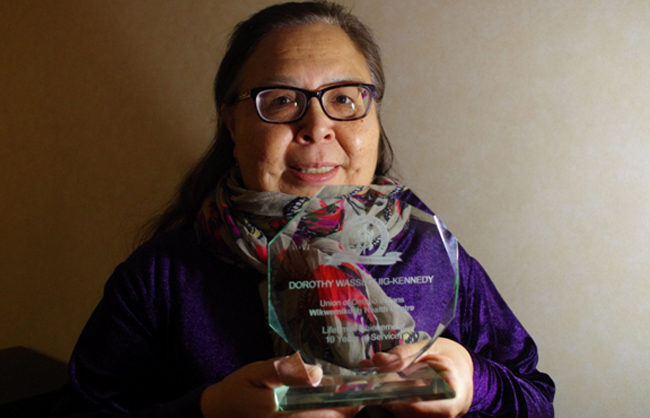Wassegijig-Kennedy receives lifetime achievement award for healing and wellness

By Rick Garrick
THUNDER BAY – Wikwemikong’s five-day forgiveness journey program was highlighted during the Aboriginal Healing and Wellness Training Conference and 20th Anniversary Celebration held in Thunder Bay.
“Because it is intense — it is five days — we need to ensure it flows,” says Dorothy Wassegijig-Kennedy, community wellness worker at Wikwemikong’s Wellness Centre. “We start out with a pipe ceremony first of all, and we have requirements — one of them is commitment — we need everyone to commit to the five days. If somebody says ‘I have an appointment on Thursday,’ then we let them know that we will be offering the program again. Nobody can be coming in and out; people have to stay and do the full five days.”
Wassegijig-Kennedy says the program was modified from a program that had been delivered in the community by Jackie Rundle, from the Sioux Lookout area in northwestern Ontario.
“We had community Elders from our area to assist with that, so when I did my own healing journey, my own forgiveness journey, I did it under her,” Wassegijig-Kennedy says. “We started out with three-day programming when I began to do the program for my community. We eventually had four-day programs. People still want the program to be a little bit longer, but a week is what it is now.”
The forgiveness journey involves six stages of forgiveness to help clients overcome painful and traumatic experiences they suffered in the past.
“The forgiveness work does involve writing a letter — you write a letter to the one you choose to forgive,” Wassegijig-Kennedy says. “We encourage them to burn their letters at the end of the program.”
Wassegijig-Kennedy has incorporated psychodrama body work and grief recovery into the forgiveness journey program, which also includes roles for an Elder, a resource person and a fire keeper.
“Some people do cry, and we are there to support them,” Wassegijig-Kennedy says. “Smudging is very important when we do this.”
In addition to presenting the forgiveness journey program at the Aboriginal Healing and Wellness Training Conference, Wassegijig-Kennedy received a lifetime achievement award. The conference was held at the Valhalla Inn from Nov. 19-20 with about 300 participants from First Nation organizations across Ontario in attendance.
”I’ve been working in my community for the past 19 years,” Wassegijig-Kennedy says about the award. “I started in 1995 when the Aboriginal Healing and Wellness Strategy was just starting up, so I guess I’m one of the older committed people that (continues on).”
During the conference, Community and Social Services Minister Helena Jaczek announced an investment of more than $10 million for the Aboriginal Healing and Wellness Strategy to help reduce family violence, violence against Aboriginal women and improve Aboriginal health, healing and wellness.
The funding includes $8.6-million to help improve the quality of life for Aboriginal people by expanding services such as crisis intervention, counselling, supports for women, children and families at risk, and health and family violence awareness and education as well as $1.5 million by 2015-16 for AHWS partners and service providers to support a strong service delivery system consisting of a stable, well-trained workforce.


